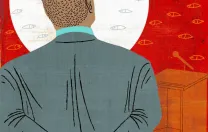Is psychiatry an empirical science that studies brain functioning, or a form of humanism that studies the inner workings of the mind in its broad social and cultural context? Assistant professor of psychiatry David Brendel takes up this question in his new book, Healing Psychiatry: Bridging the Science/Humanism Divide, in which he diagnoses the field’s internal schisms and proposes a cure.
Brendel, who is associate director of the psychiatry residency program at Massachusetts General and McLean Hospitals, argues that even though recent advances in psychiatric science (such as an awareness of the role of genetics, or the use of neuroimaging) have opened new paths to understanding and treating mental ills, psychiatrists continue to face an inescapable conundrum in every clinical interaction. “The science is there, and we need to be able to apply the science, of course,” he says. “But we also need to be aware that the person we’re talking to may not fit into the schemas that we’re using at any particular time.” The field’s current scientific tools, he contends, do not adequately address the variable forms and causes of emotional and mental suffering. “We have the age-old problem that people are complex,” he says. “They’re agents with subjectivities. They do things and experience things that are probably always going to be beyond our grasp, no matter how good our neuroimaging and genetic and other technologies are.”
|
One of the limitations of contemporary psychiatry is its “inflexible and outmoded” idea of scientific evidence, says Brendel. “In medicine and psychiatry today,” he says, “there’s been an over-valuation of the double-blind placebo-controlled trial, which adopts the mythology that we can observe the world independently of our own values.” Although this method is appropriate for testing the effectiveness of medications, he says, it excludes a wide range of treatments that can be extremely valuable: “Think of the absurdity of trying to design a double-blind, placebo-controlled trial for psychotherapy.” Brendel argues that psychiatry needs to adopt a wider view of evidence, one more akin to the ideas of quantum physics. “Physicists have moved beyond a mechanistic Newtonian view of the world,” he says. “They talk about chaos and uncertainty and about the effect that the observer has on what is being observed.”
Brendel believes psychiatrists need to embrace this more modern and dialectical model of science in order to overcome psychiatry’s conceptual rifts and better meet their patients’ needs. He lays out a formula for what he calls “clinical pragmatism,” which is based on four basic principles of psychiatric explanation. Psychiatrists, he argues, need to be practical (by focusing on good clinical outcomes for patients rather than on rigid application of “evidence-based” treatments), pluralistic (by considering a wide range of treatment approaches), provisional (by not taking any “evidence” too seriously because it is likely to change with further study and clinical experience), and participatory (by co-constructing treatment decisions with the patient).
Will psychiatry ever develop a definitive diagnostic test for mental disorders? Brendel calls this hope the “myth of psychiatric scientism.” The techniques of the neurosciences can never answer all the questions, he says, because clinicians will never be able to get away from the value assessments and the participatory element. “If a patient comes in and all I do is apply some rating scales and structured interviews, I’ve failed the patient,” he says. “This holds true today in 2006, and it will continue to be true in 2106.”






